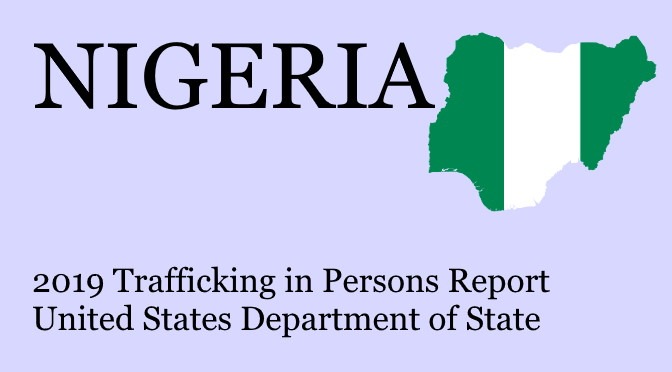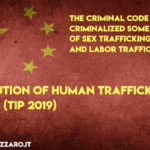
The government significantly increased anti-trafficking law enforcement efforts, but there were continued reports of government officials’ complicity in human trafficking offenses. The Trafficking in Persons Law Enforcement and Administration Act, as amended in 2015, criminalized sex trafficking and labor trafficking and prescribed a minimum penalty of two years’ imprisonment and a fine of 250,000 naira ($693) for both sex and labor trafficking; the minimum penalty for sex trafficking increased to seven years’ imprisonment and a fine of 1 million naira ($2,770) if the case involved a child victim. These penalties were sufficiently stringent and, with regard to sex trafficking, commensurate with those prescribed for other serious crimes, such as kidnapping.
NAPTIP received 938 cases for investigation, completed 192 investigations, prosecuted at least 64 suspects in 64 cases, and convicted 43 traffickers, compared with receiving 662 cases for investigation, completing 116 investigations, 43 prosecutions, and 26 convictions the previous reporting period.
During the reporting period, NAPTIP investigated four cases and initiated prosecutions of seven suspected officials complicit in trafficking. These investigations and prosecutions included NAPTIP officers, Nigerian Police Force officers, National Quarantine Service officers, Nigerian Immigration Service officials, and a Nigerian Prison Service officer. However, the government did not convict any government officials complicit in trafficking for the fifth consecutive year, despite consistent reports of government employees committing trafficking offenses each year. Despite 16 years of reports of significant government complicity in human trafficking offenses and trafficking-related corruption, the government has only reported convicting one official for complicity in human trafficking.
The government did not take adequate steps to investigate or prosecute military personnel or CJTF members complicit in trafficking in the Northeast, in particular sexual exploitation of IDPs and female detainees. The government did not report any prosecutions or convictions for sexual exploitation of IDPs, including children, and did not investigate, prosecute, or convict any government security officials, including military officials and CJTF members, alleged to have exploited IDPs. The Nigerian Army categorically denied that any of its personnel used child soldiers in the past or sexually exploited IDPs, which impeded investigation of such reports.
In past reporting periods, an international organization reported the Nigerian military used children in support roles; there were no new verified cases of such acts during the reporting period.
The government collaborated with foreign governments on anti-trafficking cases. It participated in joint investigations and provided technical assistance with countries in West Africa and Europe. Through the United Kingdom-Nigerian Joint Border Task Force, NAPTIP supported law enforcement to make significant arrests and prosecutions in multiple European countries and improved investigative capacity domestically. The government, at times in partnership with foreign donors and other international partners, trained at least 302 officials on identifying and investigating human trafficking. However, law enforcement cooperation with Italy remained uneven, partly due to the lack of a signed mutual legal assistance treaty.
Adapted from TIP 2019 by the U.S. Department of State

